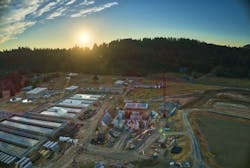About the author:
Greg Womble is a freelance writer for American Cast Iron Pipe Co. Womble can be reached at [email protected].
How do you design a water-delivery pipeline for an area that has averaged nearly one earthquake per week during the past year? Very carefully.
Most agree that Oregon, with its breathtaking mountains and rugged coastline, is a scenic wonder. Yet the geologic forces that make it so spectacular also make it one of the most earthquake-prone spots in
the country.
Take, for example, the Hillsboro, Oregon, area. Located a half-hour drive from Portland, it has been the scene of 49 recorded earthquakes from August 2018 to August 2019. Most measure less than a 2-inch magnitude, but the fact remains: any new construction requires innovative planning, design and implementation to remain resilient in the midst of regular seismic activity that has become common to the area.
This was the challenge for Oregon’s Joint Water Commission (JWC), which is owned in partnership by the cities of Hillsboro, Forest Grove, Beaverton, and the Tualatin Valley Water District. JWC currently treats, transmits and stores drinking water for more than 365,000 customers and operates the largest conventional water treatment plant in Oregon. However, due to population growth, JWC needed to strengthen the water plant infrastructure and increase capacity from 75 million gallons per day (mgd) to 85 mgd, while factoring in a potential future capacity of 105 mgd.
To meet the challenge, American Cast Iron Pipe Co. sales engineers, along with distribution partner Ferguson Waterworks, worked closely with project engineering firm Jacobs (formerly CH2M), general contractor Slayden Constructors Inc.—a subsidiary of MWH Constructors—and JWC to design a ductile iron pipe system to achieve the the water commission’s aggressive goals.
The state of Oregon requires new and retrofitted construction to meet rigorous seismic safety standards, so this project set a precedent for earthquake-resistant treatment plants in the Pacific Northwest.
“We provided a variety of 24-inch to 48-inch Flex-Ring pipe and fittings,” said Jeff Blakely, American senior sales engineer. “The design we helped develop is capable of withstanding 22 inches of permanent ground deformation due to liquefaction (a destabilization that occurs when saturated soil loses its firmness) during a seismic event.”
Robert Montgomery is senior project manager for Slayden Constructors Inc. He noted the relationship between the pipe company and engineering firm prior to the project helped meet goals.
“American came out and did a class for our installation people because the earthquake-resistant system is such a new thing,” he said. “That was very helpful. Jeff Blakely and his team have been very responsive.”
The project was completed via an alternative delivery model known as construction manager/general contractor. This method allows the owner to engage a construction manager during the design process to provide construction feasibility input. According to the U.S. Federal Highway Administration, this allows the construction manager to “provide input regarding scheduling, pricing, phasing and other input that helps the owner design a more constructible project” during the design phase. Between 60% and 90% design completion, the owner and construction manger then negotiate a guaranteed maximum price for the project based on scope and schedule.
The project was scheduled for completion in October 2019, but ran into some delays. It is now expected to be completed in January 2020. According to JWC’s October update, the filter structure underdrain was completed, and the filter media, specifically anthracite and sand, were installed. Ongoing aspects of the project include the installation of the communication network and electrical equipment as well as the installation of the final filter structure architectural details.
Despite the delay, the drinking water produced by the JWC Water Treatment Plant continues to meet and exceed all compliance standards set by the U.S. EPA Safe Drinking Water Act.
